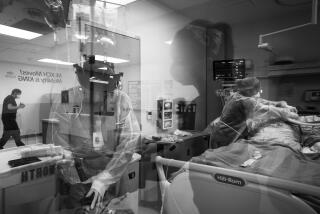Heart ailments linked to worries about terrorism
- Share via
Stress and fear about terrorism after 9/11 are giving Americans heart problems, even if they had no personal connection to the attacks, according to a UC Irvine study released Monday.
UCI researchers linked psychological stress responses to the attacks on the World Trade Center and the Pentagon to a 53% increase in heart problems -- including high blood pressure and stroke -- in the three years after Sept. 11, 2001.
It is the first study to show the effect of the 9/11 terrorist attacks on cardiac health.
Most of those surveyed had watched the attacks on live television, and one-third had no personal connection to them.
Most of them had no preexisting heart problems, and the results persisted even when risk factors such as high cholesterol, smoking and obesity were taken into account.
“It seems that the 9/11 attacks were so potent that media exposure helped to convey enough stress that people responded in a way that contributed to their cardiovascular problems,” said Alison Holman, an assistant professor of nursing science at UCI and the study’s lead researcher.
The three-year study took a random, nationwide survey of more than 1,500 adults whose health information had been recorded before the terror at- tacks.
Researchers then asked participants about their stress responses in the weeks after the attacks and issued yearly follow-up questions ending in late 2004.
Participants were asked in the online surveys to report doctor-diagnosed ailments and assess their fear of terrorism by rating on a scale how much they agreed with such statements as “I worry that an act of terrorism will personally affect me or someone in my family in the future.”
The study was written by six researchers and published in the January edition of Archives of General Psychiatry.
Chronic worriers -- those who continued to fear terrorism for several years after the attacks -- were the most at risk of heart problems.
They were three to four times more likely to report a doctor-diagnosed heart problem two to three years after the terror attacks.
Those who reported high levels of post-traumatic stress symptoms nine to 14 days after the attacks were more than twice as likely to report heart problems up to three years later.
Previous research has found that rescue and recovery workers who helped with the months-long cleanup at the World Trade Center had a higher incidence of post-traumatic stress disorder than the national population.
But this study shows that even people with no direct experience with the attacks may be psychologically and physically affected by potentially serious health problems, Holman said.
In a study released in 2002, the same UCI researchers found that 17% of the U.S. population outside New York City reported symptoms of post-traumatic stress disorder two months after the 2001 attacks.
Some of the most common triggers of terrorism-related stress have been images and videos of the Sept. 11 attacks, the rise and fall of the terrorism alert levels issued by the Department of Homeland Security, and reports of terrorism in other countries, researchers said.
“There have been a variety of events since 9/11 that have continued to reactivate concerns about terrorism, and people that worry are at the greatest risk” of developing a heart condition, said Roxane Cohen Silver, one of the study’s authors and a professor of psychology and social behavior and medicine at UCI.
Researchers say the findings may help medical and mental health workers predict within several weeks of a terrorist attack when a patient’s psychological response is likely to translate to a physical ailment.
“Now you don’t have to wait months to find out if a person has post-traumatic stress disorder to find out if they’re vulnerable to later heart conditions,” Holman said.
“If I know I have a patient who is having an acute stress reaction, I may want to intervene.”
--







